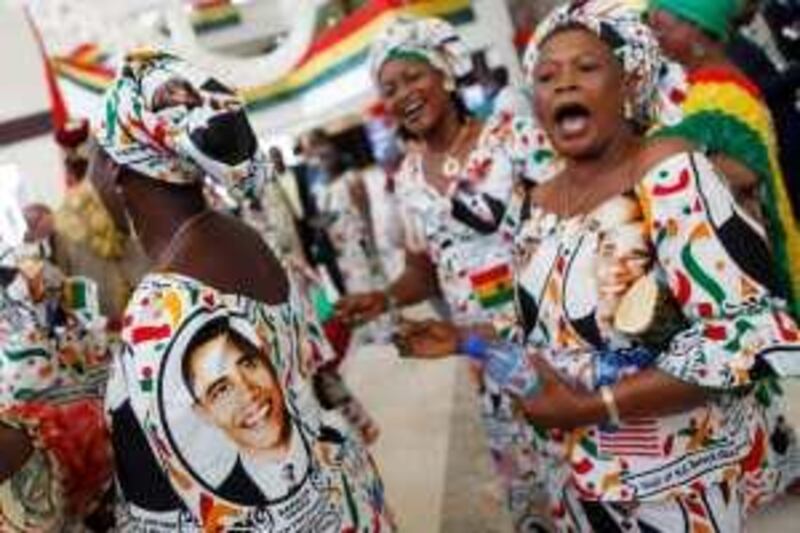ACCRA // They heard it in Zimbabwe, where Robert Mugabe has continued his heavy-handed rule for nearly three decades. They heard it in Kenya, where politicians are still wrangling for power 18 months after an election dispute ravaged the country. They heard it in Guinea, Madagascar and Mauritania, which have experienced coups in the last year. Across this continent plagued by corruption and crippled by leadership that is often less than democratic, Africans heard Barack Obama's message: "No person wants to live in a society where the rule of law gives way to the rule of brutality and bribery. That is not democracy. That is tyranny, even if occasionally you sprinkle an election in there. And now is the time for that style of governance to end," Mr Obama said in his wide-ranging speech in Ghana on Saturday. Like his speech in Cairo to the Muslim world last month, his Ghana address was meant for a broad audience, in this case all of sub-Saharan Africa. That Mr Obama came to Africa to deliver his message gives him more credibility on the continent. African strongmen will no doubt take note that the US says it will not tolerate iron-fisted regimes. But it is no longer the only power in a position to dictate terms to African leaders. China has shown it will overlook a human rights violation or two to do business with African countries. In Sudan for example, where the US has sanctions in place because of the government's human rights record, China has strong ties and guzzles most of the country's oil. Jerry Rawlings, a former president of Ghana who came to power in a coup and later instituted multiparty democracy, said Africa needs America's partnership to cement democracy on the continent. "Africa has always been able to take on that challenge," he said. "We need a transparent and accountable partner." Aside from restating US commitment of a portion of a US$20 billion (Dh73bn) G8 farm aid pledge, Mr Obama did not offer Africa anything except the vague notion of support. He said the solutions to Africa's problems need to come from Africans, a mantra that aid workers in Africa have long been repeating. "Africa's future is up to Africans," he said, but added, "America will be with you every step of the way, as a partner, as a friend." With a US back home just now bottoming out, this is no time for Mr Obama to throw money at Africa as his predecessor, George Bush, did by tripling aid to Africa. Open pockets go a long way in Africa, even though Mr Obama can probably do more for the continent by helping to end its addiction to aid and goading its leaders into better governance. Still, Africans are left wondering what Mr Obama brought them. "Given Mr Obama's ancestral heritage, the common man in any African city or village expects him to do at least as much as Mr Bush did, if not more," The Daily Nation, Kenya's leading newspaper, wrote in an editorial. "And this is where Africa goes wrong. A pervasive mentality that the only way for Africa to develop is through aid from the West needs to be done away with." Though his father comes from Kenya, Ghanaians call Mr Obama "brother". Much was made of Mr Obama's African heritage - "I have the blood of Africa within me," he said - and this made his blunt message more palatable and less condescending to Africans. Africans seemed to get the message. "His speech was brilliant because he talked about deepening democracy and investing in people," said Antwi Sekere, Ghana's deputy minister for social welfare. "America will support us but we need to take responsibility for the development of our country." The White House described Mr Obama's brief stopover in Ghana as a chance to leave a footprint on the continent and define his administration's Africa policy. He will likely make a longer, multi-nation Africa trip sometime during his term. Mr Obama also asked Africans to send him questions via text message. The White House received more than 5,000 questions from across the continent, and Mr Obama answered some of them in an online video posted late yesterday. If nothing else, Mr Obama's visit to Africa got people talking about this neglected continent. It was a well-chosen finale to the president's week-long trip that included a summit in Russia and a G8 meeting in Italy, which focused in part on development in Africa. Even if Mr Obama did not bring solutions for Africa's problems, he got the continent at the top of the news agenda. "Africa is in the headlines this week," said Emmanuel Gyimah-Boadi, director of the centre for democratic development in Accra, Ghana's capital. "This encourages us Africans to stay the course." mbrown@thenational.ae
Obama, the empty-handed
Apart from rhetoric, Africans wonder what the US president brought them when he addressed Ghana's parliament.

Editor's picks
More from the national




